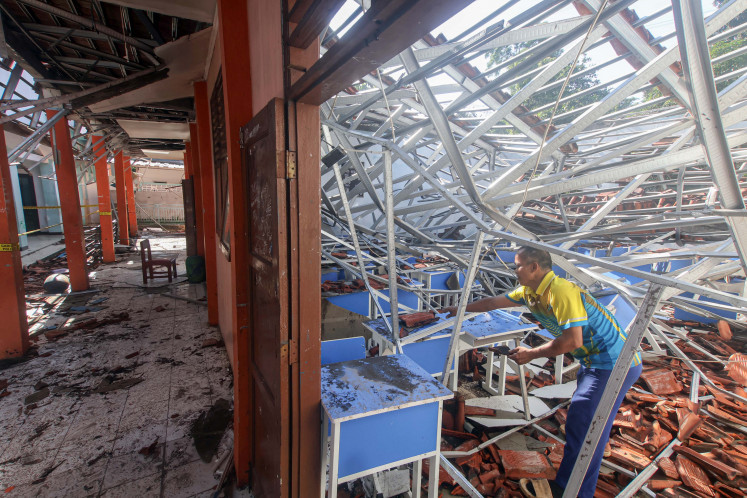Popular Reads
Top Results
Can't find what you're looking for?
View all search resultsPopular Reads
Top Results
Can't find what you're looking for?
View all search resultsGovt mulls to ban holiday exodus
Keep your distance: Passengers sit in a lounge with social distancing signs before boarding the Singosari train toward Blitar, East Java, at Senen Station in Jakarta on Thursday
Change text size
Gift Premium Articles
to Anyone
K
eep your distance: Passengers sit in a lounge with social distancing signs before boarding the Singosari train toward Blitar, East Java, at Senen Station in Jakarta on Thursday.(JP/Seto Wardhana)
The government is mulling over a plan to ban this year’s Idul Fitri mudik (exodus) to prevent city dwellers from spreading the coronavirus to towns and villages across the archipelago, but questions remain as to how such a ban would be implemented.
Ramadan is expected to take place from April 23 to May 23 this year, followed by the Islamic holiday on May 24 and 25.
This Idul Fitri season was expected to see some 20 million people travel to their places of origin, resulting in a massive stream of urbanites to rural areas. In the current coronavirus crisis, with 893 confirmed infections and 78 deaths logged nationwide up until Thursday, government officials and experts have expressed worry that the exodus might trigger an explosion of cases and deaths.
The Office of the Coordinating Maritime Affairs and Investment Minister conducted a meeting with other institutions on Monday to discuss the matter. The office’s spokesperson, Jodi Mahardi, said a mudik ban was an option “seriously considered” by the government.
“The safety of the people is our priority,” he told The Jakarta Post on Thursday.
He said that a limited Cabinet meeting had been scheduled for Friday to discuss the government’s final decision on the issue.
In a press release issued by the office on Tuesday, Jodi said that three scenarios had been presented to President Joko “Jokowi” Widodo; the first was the business-as-usual scenario — meaning the mudik would proceed just like in the past; the second was to allow people to proceed with the mudik but not to actively support it, such as through companies offering free transportation as they typically do, and the last was to ban the mudik.

The statement also said that the Transportation Ministry would reduce the passenger quota of flights by up to 50 percent and would restrict vehicles from Greater Jakarta, deemed to be the epicenter of the new virus strain within the country, from traveling to Central Java and East Java.
As several cities including Jakarta have ordered offices, schools and public centers to temporarily close to support the physical distancing policy, several areas in Central Java have seen a surge in incoming traffic, which some have called an early mudik.
Central Java Governor Ganjar Pranowo said he had obtained reports from regents and mayors that the inflow of people from Jakarta to the province had already begun.
“In Jepara, 44 buses arrived, carrying homecomers from Jakarta. It indeed happening early, maybe because the offices and companies where they work had reduced their working hours or even stopped operating,” Ganjar said.
In Wonogiri, the local administration recorded 14,000 people coming into the regency last week, with the daily arrival of bus passengers twice the normal number at 2,000 people.
The Transportation Ministry has predicted that, without restrictions, millions of Indonesians will hit the road using private vehicles in the next few weeks to avoid contracting the virus in public transportation.
Land Transportation Director General Budi Setyadi told the Post on Thursday that the ministry was planning to limit toll road access to vehicles from Greater Jakarta, although it had yet to come up with clear mechanisms.
“[A toll road restriction] would not be enough to prevent people in the epicenter from traveling to their hometowns,” he said, adding that further decisions would be taken during the limited Cabinet meeting.
The ministry previously abolished all free mudik travel programs for this year given the country’s emergency status imposed until May 29. Before the program was canceled, the ministry alone had planned to provide 1,317 buses to carry 59,265 passengers from Greater Jakarta to 37 destinations across Indonesia.
The statement from the Office of the Coordinating Maritime Affairs and Investment Minister also revealed that the National Police would carry out their annual security operation, while Indonesian Military personnel would be deployed at toll road gates to oversee the “no mudik” policy this year.
State-owned railway operator PT Kereta Api Indonesia (KAI) said it would reduce the number of trips per day from 532 to 429 starting on April 2, to suppress COVID-19 transmission. Passengers canceling trips would get a 100 percent refund.
PT KAI spokesperson Yuskal Setiawan told the Post that 878,179 tickets had been sold for exodus trips, and only 120,823 people had canceled their trips so far.
Transportation experts have warned that, because of the outbreak, the mudik had already begun, especially from Jakarta, where physical distancing measures left informal sector workers on low incomes with no option but to return to their hometowns to make a living.
Djoko Setijowarno of the Indonesian Transportation Society (MTI) said the government should ban the mudik as early as possible, such as by imposing community quarantine in the Greater Jakarta area to contain the virus. Sanctions had to be imposed, he added.
— Suherdjoko and Ganug Nugroho Adi contributed to this report from Central Java.










